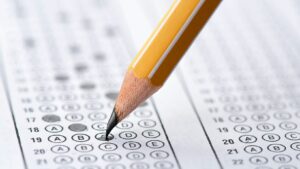Mastering the GRE writing section is a pivotal step toward securing a spot in your dream graduate program. With its unique blend of analytical writing tasks, the GRE writing section challenges test-takers to articulate complex ideas clearly and effectively. It’s not just about showcasing your vocabulary or grammar skills; it’s about demonstrating critical thinking, persuasive writing, and the ability to dissect arguments with precision.
GRE Writing Tips
What Is the Analytical Writing Assessment?
 The GRE Analytical Writing Assessment (AWA) stands as a vital component of the exam, designed to evaluate a test taker’s ability to articulate complex ideas clearly and effectively. It tests one’s critical thinking and analytical writing skills, including the ability to support ideas with logical reasoning and relevant examples, as well as the capability to examine claims and accompanying evidence. The AWA consists of two distinct tasks: the “Analyze an Issue” task and the “Analyze an Argument” task. In the “Analyze an Issue” task, examinees must craft an essay that presents a well-reasoned stance on a given topic, whereas the “Analyze an Argument” task requires them to evaluate the logic of an argument presented in a brief passage. These tasks measure the ability to construct coherent responses under time constraints, making them critical for those looking to showcase their writing proficiency to graduate programs.
The GRE Analytical Writing Assessment (AWA) stands as a vital component of the exam, designed to evaluate a test taker’s ability to articulate complex ideas clearly and effectively. It tests one’s critical thinking and analytical writing skills, including the ability to support ideas with logical reasoning and relevant examples, as well as the capability to examine claims and accompanying evidence. The AWA consists of two distinct tasks: the “Analyze an Issue” task and the “Analyze an Argument” task. In the “Analyze an Issue” task, examinees must craft an essay that presents a well-reasoned stance on a given topic, whereas the “Analyze an Argument” task requires them to evaluate the logic of an argument presented in a brief passage. These tasks measure the ability to construct coherent responses under time constraints, making them critical for those looking to showcase their writing proficiency to graduate programs.
How It’s Scored and Why It Matters
Scoring for the GRE AWA section ranges from 0 to 6, in half-point increments. Each essay is evaluated by both a human grader and a computerized grading program called e-rater. These scores are then averaged to obtain the final score for each essay, and if there’s a significant discrepancy between the human and computer scores, a second human grader is employed to resolve the difference. The criteria for scoring include clarity, coherence, logical argumentation, and adherence to standard written English conventions.
Understanding how the AWA is scored is imperative because it shows graduate schools one’s ability to think critically and write analytically. High scores indicate that a candidate can effectively communicate complex ideas and arguments, an essential skill for success in most graduate programs. Moreover, because the writing skills assessed in the AWA are foundational to many fields of study, a strong performance can significantly enhance a graduate school application. Incorporating these GRE writing tips not only prepares examinees to excel in the AWA section but also equips them with skills that are valuable in their academic and professional endeavors.
Preparing for the GRE Writing Tasks
 Preparing for the GRE writing tasks requires a strategic approach to mastering the art of clear articulation and critical thinking under timed conditions. Familiarizing oneself with the test format and practicing extensively are key steps toward achieving a high score in the Analytical Writing Assessment (AWA). Here, practicing essay writing, focusing on organizing thoughts coherently, and developing a strong argumentative stance are crucial. Understanding the scoring criteria enhances one’s ability to tailor responses to what evaluators seek: clarity, coherence, logical argumentation, and adherence to standard English conventions. Preparing effectively for the GRE writing tasks not only boosts one’s confidence but also showcases valuable analytical writing skills to graduate schools.
Preparing for the GRE writing tasks requires a strategic approach to mastering the art of clear articulation and critical thinking under timed conditions. Familiarizing oneself with the test format and practicing extensively are key steps toward achieving a high score in the Analytical Writing Assessment (AWA). Here, practicing essay writing, focusing on organizing thoughts coherently, and developing a strong argumentative stance are crucial. Understanding the scoring criteria enhances one’s ability to tailor responses to what evaluators seek: clarity, coherence, logical argumentation, and adherence to standard English conventions. Preparing effectively for the GRE writing tasks not only boosts one’s confidence but also showcases valuable analytical writing skills to graduate schools.
Essential GRE Writing Tips
Understand the Rubric
Acquainting oneself with the scoring rubric enables test-takers to tailor their responses to meet specific criteria. High scores require not just clarity and coherence but also a strong logical structure and rigorous argumentation.
Practice with Variety
Diversifying writing practice with various prompts for both “Analyze an Issue” and “Analyze an Argument” tasks is crucial. This variety prepares test-takers for different question types, enhancing adaptability under timed conditions.
Develop a Template
Creating a personal essay template can streamline the writing process during the exam. This template should include a clear introduction, body paragraphs with evidence, and a compelling conclusion, ensuring a coherent and structured response.
Focus on Time Management
Effective time management is paramount. Allocating specific time blocks for brainstorming, writing, and revising can help maintain quality and completeness without running out of time.
Review and Revise
Critical to achieving a high score is the ability to review and revise. Identifying and correcting grammatical errors, strengthening arguments, and clarifying ideas within the given time frame can significantly enhance the essay’s overall quality.
